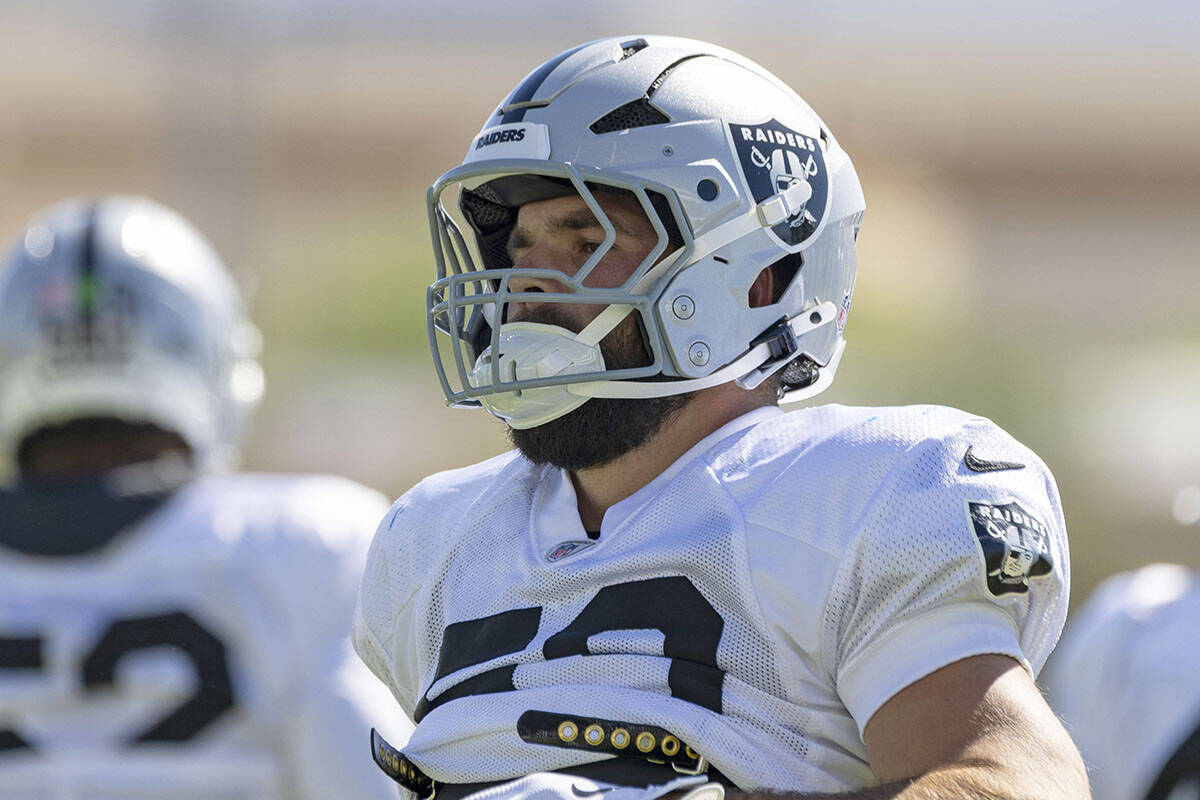Raiders special teamer talks West Point degree, future military service
Jon Rhattigan has a degree in geospatial information science and will one day be an officer in the Army.
He also happens to be a good football player.
The Raiders signed the linebacker off the Steelers’ practice squad this month. Rhattigan, who went undrafted out of Army in 2021, has since been a steadying force on a shaky special teams unit.
The 26-year-old sat down with the Review-Journal this week to discuss changing teams midseason, his decision to go to West Point and what geospatial information science is:
RJ: You seem to have found a home with the Raiders under Pete Carroll, your first NFL coach with the Seahawks. But what were the last couple of weeks like on and off the field?
Rhattigan: For both, I mean, just a lot of adjusting, honestly. I would say more than anything, my focus has been on the field and in the building because it’s such a quick turnaround. And you just find yourself immersed in a new locker room trying to get (reacquainted) with a previous scheme that I had played. And then at the same time, you’re meeting all your teammates in the middle of the season and just trying to get a feel for how the building operates and everything. So I would say on the field, it’s really just a matter of jelling with the team and meeting everybody and kind of seeing how things operate. Off the field, you’re staying in a hotel again for a little bit and trying to find a place to live. You’re trying to enjoy some free time and keep yourself mentally locked in, but there’s just a lot of variables to it. And overall, I’d say it’s definitely a lot of adjusting. But it hasn’t been too much of a challenge. I feel like we have a great locker room and great support staff in this organization, so that’s helped things be pretty smooth.
RJ: Las Vegas is a pretty unique place to move to in the middle of a season. What are your thoughts after having been here a few weeks?
Rhattigan: I definitely see it in a different light even though it’s only been two weeks. It’s kind of a different feel when you live out here. A lot of people associate Vegas with fun and whatnot, but for me, it’s really a great opportunity to come here and go to work and keep my career going in the direction that I want it to. So when I first heard it, I was excited. And now that I’m here and I’m getting familiar with everything, I’m still very excited and really looking forward to the rest of the season, regardless of what happened last Sunday. … My first week here, we won. My second week, we lost. So now it’s just about coming together. It’s football at the end of the day so I bring any experience that I have and try to be the best teammate that I can be. And I’m still looking forward to the rest of the season.
RJ: What’s the secret to being a great special teams player?
Rhattigan: I think ultimately, you have to want to do it. You have to be physical. Then I’d say vision and physicality. You have to be able to see what’s going on right in front of you down the field. Special teams requires tackling, blocking, field position, everything. There’s just so many different components to it. … And ultimately, special teams can definitely have drastic impacts on the game. So my goal has always been to make that positive impact, be a positive change for the team.
RJ: When you first committed to Army, you said you chose them in part because they continued recruiting you after a major injury in high school. But, in the end, it’s a pretty unique place. Why was that right for you?
Rhattigan: It was a challenging decision. All in all, West Point had a lot of the things I was looking for in a school. It kind of checked all those boxes. I knew it was going to be a challenge, but at the time, I definitely was looking forward to challenging myself. I think the biggest thing was definitely just playing Division I FBS football while also getting a great education. I did get injured when I was young, so I didn’t have the NFL by any means as a guarantee and I felt like West Point was going to be a good opportunity to play football in college but also kind of set myself up after college.
RJ: The rules didn’t even allow service academy players to go to the NFL at the time.
Rhattigan: Right, but what it really came down to was just, ‘This is what I’m looking for. This is something that I know will be a sacrifice, but it’ll better for me down the road.’ And the more time I’ve spent away from that place since graduating, the more appreciation I have for it. I think a lot of it came down to not only did they stay loyal to me through recruiting, but it’s a fantastic place to go to school and there’s just so many great traditions. It’s a great organization to be a part of, not only the military, not only West Point as an academy, but the football team. I couldn’t be anything but appreciative for my time there. … There’s a lot to offer at West Point, and so I used it as a way to kind of better myself and try to reach my potential as a man.
RJ: What’s it like to balance the rigors of being a student at West Point with trying to play football?
Rhattigan: It was tough. There’s no doubt that it was tough and challenging, but that’s also what makes it so rewarding. And it’s another one of those things where you’re surrounded by so many great people and so you’re truly never alone, right? There’s always somebody going through the same thing as you. Whether it’s the exact same thing or just a similar situation, you know you have people to lean on. And you have a great support staff. So is it a sacrifice? It’s an absolute sacrifice and an absolute challenge that you have to be willing to accept while going there. But you know you’re not alone and you’re all in it together. But not only that, but going to West Point and trying to balance football and the academy, that’s also your team. And that’s football, right? That’s what we’re doing right now. We’re 2-5. We’re nowhere near where we want to be or where we can be, but we can lean on each other and we can continue to get better. We’re going through a hard time right now, but that doesn’t mean there’s not a light at the end of it.
RJ: OK, what exactly is geospatial information science?
Rhattigan: GIS mostly has to do with satellite imagery and data collection. It was in the geography department, which is the department I knew I wanted to be in. I’ve always had a huge fascination with the outdoors, and simply put, I would say the easiest example I could give you of GIS is Google Maps, right? We have all this stuff at the touch of our hands and it helps you analyze, whether you’re going down the street or driving across the country or you’re looking for a place to eat, that has to do with geospatial information science. … It’s kind of one of those things that’s become more applicable, obviously, as we advance our technologies and whatnot and it’s obviously a very applicable study in regards to the military.
RJ: How much pride have you taken in being able to raise money and awareness for military causes during your time in the NFL?
Rhattigan: I’ve taken a lot of pride in representing the community as opposed to just the financial aspect of things. I think it’s more just kind of what I’m representing, especially when “My Cause, My Cleats,” comes around. I usually will honor an organization called Mission 22, which actually helps veterans suffering from (post-traumatic stress disorder) or just suffering in general from anything post-military career. It means a lot for me just to be able to represent something bigger than myself, especially something that really touches everybody in one way or another, whether it’s immediate, personal family, friends, whatever it might be, right? The military is all-encompassing to our society. And so to be able to represent something bigger than myself always means a lot to me.
RJ: Everybody in the NFL knows their career could be over tomorrow. But most players then have to start thinking about what they are going to do next. You know you have a five-year military commitment. How much does that change your mindset about your career?
Rhattigan: I would say that’s a good question, but at the same time, if you’re sitting in this locker room and you’re in the middle of a season, you’re not thinking about anything other than the next practice or the next meeting or the next game. You’re thinking about today. You’re taking things one step at a time because that’s what this game and certainly this league requires of you on an individual level. The same way as a team you can’t be looking too far into the future. Granted, in the offseason, I’m definitely not as stressed about going to an (NFL Players Association) workshop or exploring career options like some other guys are. But in order to be successful in this game or really anything in the way you need to be, you have to be where your feet are and locked in on the present moment. So I’m focused on today right now and I’m a Raider right now, which is such a blessing. So not only for appreciation’s sake, but for success purposes, I’m trying to play football as long as I can and focus on playing football as long as I can. Then I know the decisions I made when I was younger will ultimately serve me well in the future.
RJ: Many people would look at an Army grad who is also a pro athlete and assume they are a regimented person who has every minute of every day scheduled and planned. But when you just take a day off and chill, what does that look like?
Rhattigan: Man, that’s my favorite question. I do have a huge interest in the outdoors, so if I’m physically capable I love to get outside even if it’s just an hour-long walk to kind of clear my head. I love hanging out with friends and family. I’ve also been very into books lately. I think it was two offseasons ago I really kind of got into reading a lot more. I gave up video games and kind of turned to books, which has been a good thing for me. But I’d say quality time with friends and family is the most important, especially in-season because you kind of do feel like everything is revolving so much on football. I have lived a very regimented life, honestly, but deep down at my core I’d say I’m actually a pretty free-spirited person, so I enjoy just chilling with the right people. It’s really the offseason when you have a little time to pick up a hobby and read, though. But I would say I really am more free-spirited than people would assume.
Contact Adam Hill at ahill@reviewjournal.com. Follow @AdamHillLVRJ on X.



















